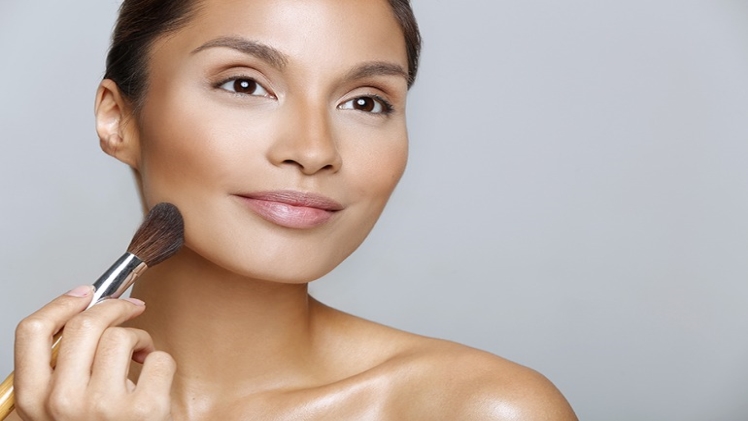Contour makeup is a technique used to define and enhance the natural structure of the face by creating shadows and highlights. The primary goal of contouring is to add depth, dimension, and definition to the facial features. This makeup technique uses different shades of makeup products, typically a contour shade (darker) and a highlight shade (lighter), to create the illusion of a more sculpted and balanced face.
The Importance of Contouring
Contouring is a makeup technique that can be particularly important for different face shapes because it helps balance and enhance each face shape’s unique features. Here’s why contour makeup is important for various face shapes:
- Round Face: Contouring adds definition and slims the face.
- Oval Face: Enhances features and adds dimension.
- Square Face: Softens angles and creates a more rounded appearance.
- Heart-shaped face: Balances the wider forehead with the narrower chin.
- Diamond Face: Minimizes wide cheekbones for more symmetry.
- Long Face (Rectangular or Oblong): Adds width for balance.
- Triangular Face: Balances the wider jawline with the narrower forehead.
- Pear-Shaped Face: Adds definition to the upper face, drawing attention upward.
Contouring can be adapted to suit personal preferences while considering the face shape for the desired look.
Types of Contouring Products
Various types of contouring products are available, each with unique advantages and applications. The three main types of contouring products are:
Cream Contour: Cream contour products come in a creamy consistency and are typically packaged in compacts or sticks. They are known for their blend-ability and are excellent for creating a more natural and dewy finish. Those favour cream contours with dry or combination skin as they can provide a hydrated and sculpted look.
Powder Contour: Powder contour products come as pressed or loose powders. They are popular for their ease of use and work well for oily or combination skin types, as they offer a matte finish. Powder contours are known for their buildable coverage and can be applied on top of the foundation for a more defined look.
Liquid Contour: Liquid contour products are versatile and are typically found in bottles or tubes. They provide a natural, radiant finish and can work for most skin types. Liquid contours require careful blending, making them ideal for those who want a subtle, seamless, sculpted appearance. They can be blended easily with foundation or applied over it for a more radiant finish.
The choice of contouring product depends on personal preference, skin type, and the desired makeup look. Some individuals prefer mixing and matching different contouring products to achieve their desired effects. Experimenting with these products can help you find the best fit for your makeup routine and skin type.
Choosing the Best Contour Makeup For You
Choosing the best contour makeup for you depends on various factors, including your skin type, makeup skill level, and the look you want to achieve. Here’s a step-by-step guide to help you make the right choice:
Know Your Skin Type: Consider your skin type. If you have dry or combination skin, cream or liquid contour products may work well, providing a more hydrating and natural finish. For oily skin, powder contour may be preferable for its matte finish.
Understand Your Face Shape: Familiarize yourself with your face shape. Different face shapes may benefit from specific contouring techniques and products. Understand how contouring can enhance or balance your unique features.
Consider Your Makeup Skill Level: If you’re a beginner or less experienced with makeup, powder contours are easier to work with due to their blendability and forgiving nature. Cream and liquid contours can be trickier to blend, so they are better suited for those with more advanced makeup skills.
Determine the Look You Want: Consider the makeup look you want. If you prefer a natural, everyday look, you may opt for a cream or liquid contour with a subtle and radiant finish. For a more dramatic, chiselled appearance, powder contour products can be built up for intensity.
Choose the Right Shades: Ensure the contour and highlight shades you choose to complement your skin tone. The contour shade should be a couple of shades darker than your natural skin tone, while the highlight should be lighter.
Test and Experiment: It’s important to test products in-store or purchase samples. Test the product on your skin to ensure it matches your skin tone and blends well. Experiment with different products and techniques to find the best suits you.
Read Reviews and Seek Recommendations: Online reviews and recommendations from friends or makeup artists can help make an informed decision. They can provide insights into the quality and performance of various contour products.
Think About Your Lifestyle: Consider your daily routine and lifestyle. If you’re on the go, you may prefer a product that is easy to carry and apply without fuss.
Budget Constraints: Contour makeup products come in a wide price range. Consider your budget and find products that offer a good balance of quality and affordability.
Ultimately, choosing the best contour makeup for you may involve trial and error. It’s important to experiment with different products, techniques, and shades to find what works best for your unique needs and preferences. Additionally, seeking advice from makeup professionals can be beneficial in finding the perfect contour makeup for your specific situation.

